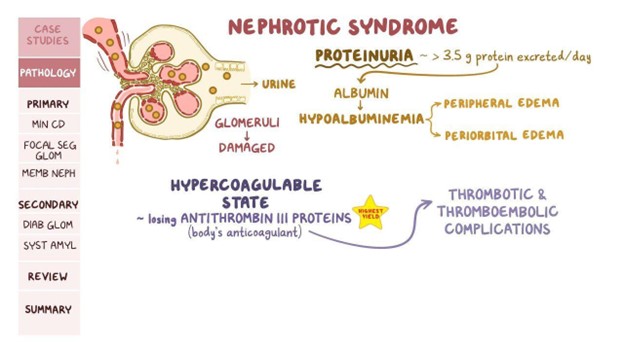A nurse is caring for a child who has a suspected diagnosis of bacterial meningitis. Which of the following actions is the nurse's priority?
Document intake and output.
Administer antibiotics when available
Reduce environmental stimuli
Maintain seizure precaution
The Correct Answer is B
A) Document intake and output:
Documenting intake and output is an important nursing task, but it is not the top priority in a suspected case of bacterial meningitis. Timely administration of antibiotics to treat the infection takes precedence over documentation of intake and output.
B) Administer antibiotics when available.
Explanation:
Bacterial meningitis is a serious and potentially life-threatening infection of the membranes covering the brain and spinal cord. Rapid administration of antibiotics is crucial to effectively treat the infection and prevent its spread. Delay in antibiotic administration can lead to worsening symptoms and complications. Therefore, getting the appropriate antibiotics to the child as soon as they are available is the nurse's priority.
C) Reduce environmental stimuli:
Reducing environmental stimuli can be helpful in managing symptoms and providing comfort to the child with meningitis, but it is not the priority action. The immediate concern in a suspected case of bacterial meningitis is to treat the infection.
D) Maintain seizure precaution:
While maintaining seizure precautions is important, especially if the child has a history of seizures, it is not the top priority in a suspected case of bacterial meningitis. Administering antibiotics to treat the infection and prevent its progression is the primary concern.
Nursing Test Bank
Naxlex Comprehensive Predictor Exams
Related Questions
Correct Answer is ["50"]
Explanation
To calculate the mL of phenytoin oral solution needed for a 250 mg dose, we can use the following equation:
Dose (mg) = Volume (mL) × Concentration (mg/mL)
Given:
Dose = 250 mg
Concentration = 25 mg/5 mL
We need to find the volume (mL):
Volume (mL) = Dose (mg) / Concentration (mg/mL)
Volume (mL) = 250 mg / (25 mg/5 mL)
Volume (mL) = 250 mg / (5 mg/mL)
Volume (mL) = 50 mL
So, the nurse should administer 50 mL of phenytoin oral solution per dose.
Correct Answer is C
Explanation
A. "We worry about surgery. Do you think we should investigate direct donation of blood?"
Explanation: This statement doesn't show a clear understanding of nephrotic syndrome. Nephrotic syndrome is a kidney disorder that involves the kidneys' ability to filter blood, but it doesn't typically involve blood donation or surgery related to that. Direct donation of blood is not relevant to the treatment or management of nephrotic syndrome.
B. "We'll have to encourage lots of liquids. Did you say about Biters per day?"
Explanation: This statement suggests a misunderstanding of nephrotic syndrome and its management. Encouraging lots of liquids is generally not a primary concern in nephrotic syndrome. In fact, excess fluid intake might be counterproductive, as it could worsen edema (swelling) that often occurs with this condition. Additionally, the term "Biters per day" doesn't seem relevant to nephrotic syndrome or its management.
C. "My child really likes chips and bologna. I guess we will have to find something else."
Explanation: This statement indicates an understanding of dietary considerations related to nephrotic syndrome. Nephrotic syndrome involves protein loss through the urine, which can lead to low protein levels in the blood. To address this, dietary changes are often recommended to include foods rich in protein. Avoiding high-sodium foods like chips and bologna is also important, as excessive sodium intake can contribute to fluid retention and worsen edema.
D. "We understand the need for antibiotics, hope they can be given orally."
Explanation: This statement doesn't relate to nephrotic syndrome or its management. Nephrotic syndrome primarily involves issues with kidney function and protein loss, and antibiotics are not a standard treatment for this condition. Antibiotics are used to treat infections, which can sometimes be a complication of nephrotic syndrome due to the immune system's vulnerability, but the statement doesn't focus on the understanding of the disease itself.
Correct Answer: C. "My child really likes chips and bologna. I guess we will have to find something else."
Explanation: This statement shows an understanding of the dietary changes needed for a child with nephrotic syndrome. It acknowledges the importance of adjusting the child's diet to include protein-rich foods and avoid high-sodium options, which aligns with the nutritional considerations for managing nephrotic syndrome.

Whether you are a student looking to ace your exams or a practicing nurse seeking to enhance your expertise , our nursing education contents will empower you with the confidence and competence to make a difference in the lives of patients and become a respected leader in the healthcare field.
Visit Naxlex, invest in your future and unlock endless possibilities with our unparalleled nursing education contents today
Report Wrong Answer on the Current Question
Do you disagree with the answer? If yes, what is your expected answer? Explain.
Kindly be descriptive with the issue you are facing.
